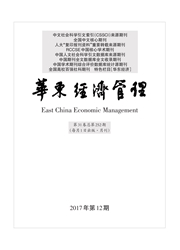

 中文摘要:
中文摘要:
文章以2012年11月19耳酒鬼酒塑化荆超标事件报道为例,对产品负面报道外部性的短期效应进行了检验。结果发现:第一,产品属性是否相同并不是企业遭受传染效应或竞争效应的本质原因,同化一对比理论对此的解释并不完全适用;第二,传染效应和内部控制机制的直接影响都将促使企业采用高杠杆化策略。而内部控制机制的间接影响则弱化了企业采用低杠杆化策略的动机,资产负债表修复理论不太适用于解释危机持续期间企业的经营决策行为。这一研究的政策含义在于:一方面政府应通过建立健全和有效运行产品质量监管制度强化消费者的信心以弱化产品负面报道的外部性;另一方面企业应注重加强内部控制机制的建设以屏蔽产品负面报道外部性的影响。
 英文摘要:
英文摘要:
Applying the case of Jiugui Liguor Plasticizer Storm report on November 19, 2012, the paper tests the short-term effect of externality of product negative reports. The paper finds that: Firstly, the essential cause of both contagion effect and competitive effect is not that product attributes are the same or not, and it is improper to explain externality of product nega- tive reports with the assimilation and contrast theory. Secondly, the contagion effect and the direct effect of the internal con- trol mechanism will encourage enterprises to adopt high leverage strategy, whereas the indirect effect of the internal control mechanism will weaken the motivation of enterprises to adopt low leverage strategy, the balance sheet repair theory is not suit- able to explain decision-making and operation activities of enterprises during the period of the crisis. The policy implication of this study is that, On the one hand, the government should establish a sound and effective operation of the product quality supervision system in order to increase consumer confidence and weaken the externality of product negative reports. On the other hand, enterprises should strengthen the construction of the internal control mechanism to shield the effect of the exter- nality of product negative reports.
 同期刊论文项目
同期刊论文项目
 同项目期刊论文
同项目期刊论文
 期刊信息
期刊信息
